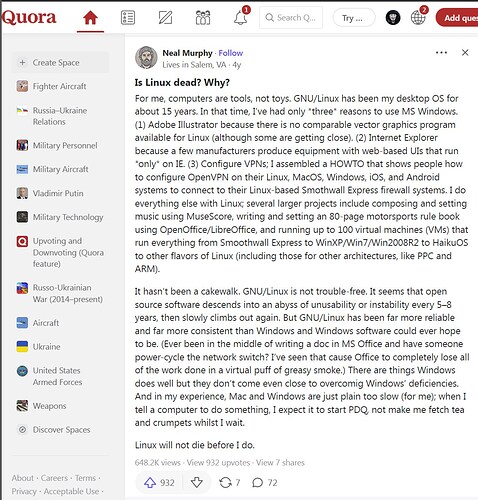Is Linux dead? Why?
For me, computers are tools, not toys. GNU/Linux has been my desktop OS for about 15 years. In that time, I’ve had only three reasons to use MS Windows. (1) Adobe Illustrator because there is no comparable vector graphics program available for Linux (although some are getting close). (2) Internet Explorer because a few manufacturers produce equipment with web-based UIs that run only on IE. (3) Configure VPNs; I assembled a HOWTO that shows people how to configure OpenVPN on their Linux, MacOS, Windows, iOS, and Android systems to connect to their Linux-based Smothwall Express firewall systems. I do everything else with Linux; several larger projects include composing and setting music using MuseScore, writing and setting an 80-page motorsports rule book using OpenOffice/LibreOffice, and running up to 100 virtual machines (VMs) that run everything from Smoothwall Express to WinXP/Win7/Win2008R2 to HaikuOS to other flavors of Linux (including those for other architectures, like PPC and ARM).
It hasn’t been a cakewalk. GNU/Linux is not trouble-free. It seems that open source software descends into an abyss of unusability or instability every 5–8 years, then slowly climbs out again. But GNU/Linux has been far more reliable and far more consistent than Windows and Windows software could ever hope to be. (Ever been in the middle of writing a doc in MS Office and have someone power-cycle the network switch? I’ve seen that cause Office to completely lose all of the work done in a virtual puff of greasy smoke.) There are things Windows does well but they don’t come even close to overcomig Windows’ deficiencies. And in my experience, Mac and Windows are just plain too slow (for me); when I tell a computer to do something, I expect it to start PDQ, not make me fetch tea and crumpets whilst I wait.
Linux will not die before I do.

